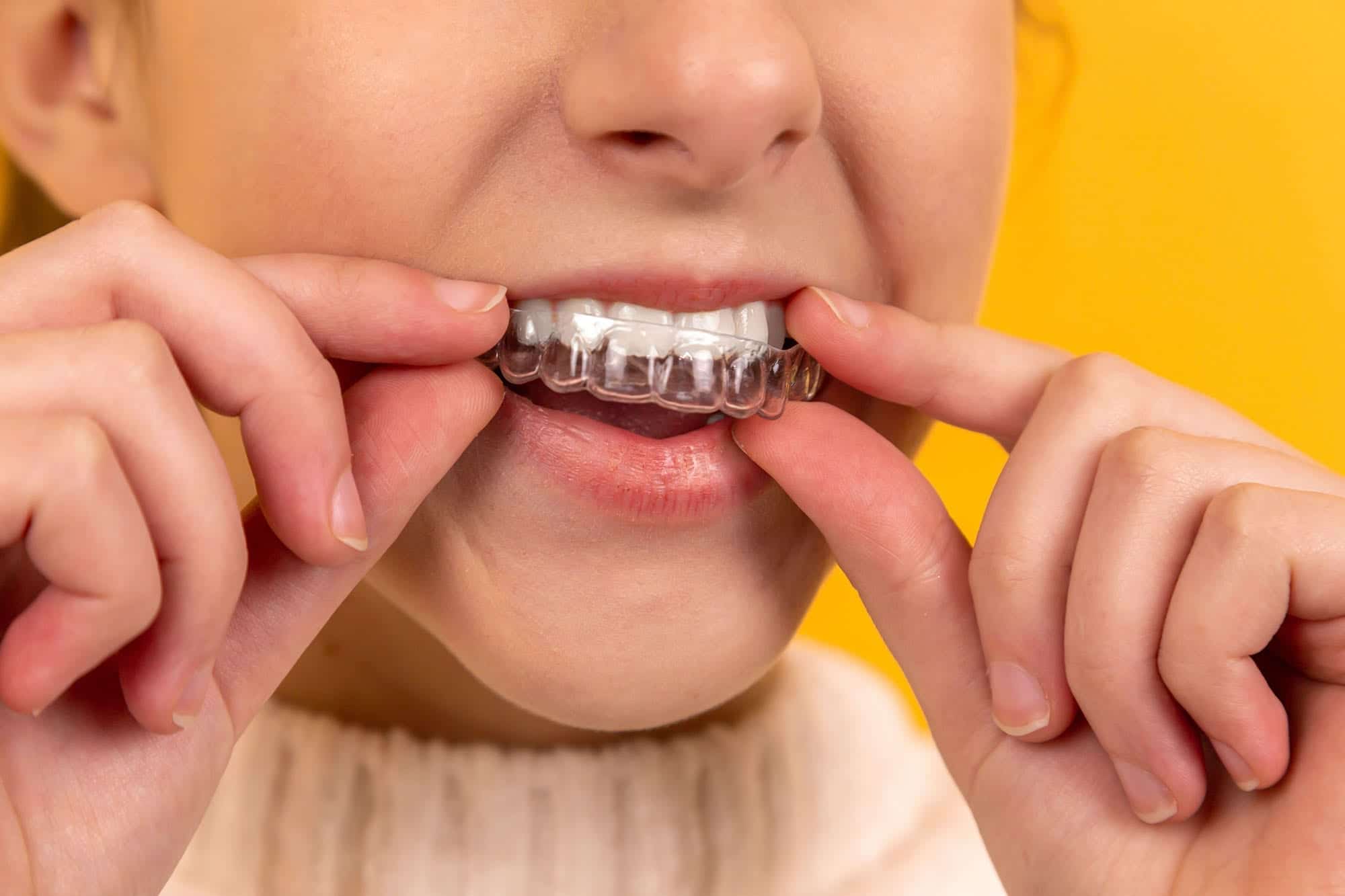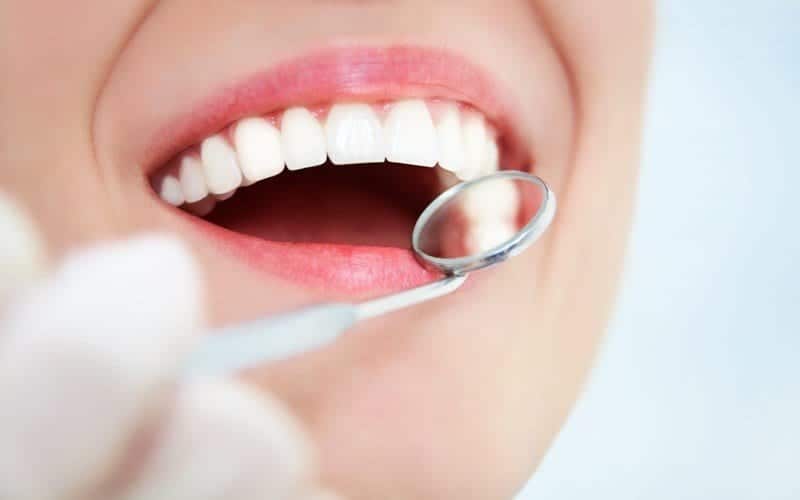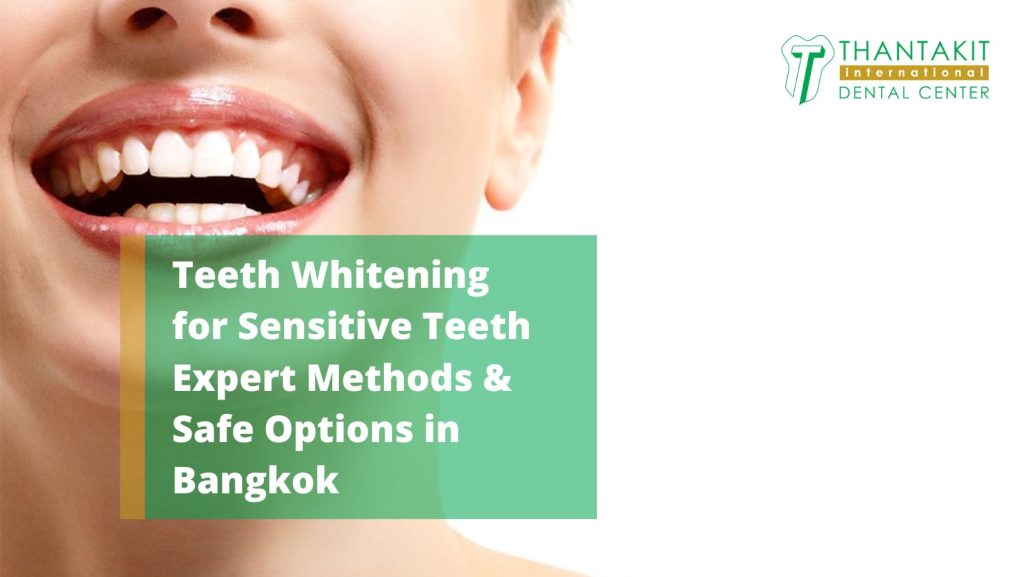As a restorative dentistry specialist at Thantakit Dental Center in Bangkok, I’ve spent over 15 years helping patients achieve brighter smiles, including those with particularly sensitive teeth. I’m Dr. Thiti Sirikrai, and I understand the unique challenges that tooth sensitivity presents when considering whitening treatments.
Throughout my career, I’ve witnessed countless patients transform their smiles safely and comfortably, even when they initially believed their sensitive teeth made whitening impossible. Today, I’ll share my professional insights on the best whitening methods and products specifically designed for sensitive teeth, drawing from both clinical research and real patient experiences at our Bangkok Center.
Teeth whitening has become increasingly popular as people seek to enhance their smiles and boost their confidence. For many, a bright smile represents good health and self-care. However, if you have sensitive teeth, the prospect of whitening can feel daunting or even frightening. Sensitivity can transform what should be a positive, uplifting experience into something uncomfortable or painful. The good news is that with the right methods and products specifically formulated for sensitivity, you can achieve effective whitening results without unnecessary discomfort or complications.
Page Contents
Understanding Tooth Sensitivity: A Clinical Perspective
Tooth sensitivity, also known as dentin hypersensitivity, affects about 25–30% of the adult population according to systematic reviews of epidemiological studies.
As a restorative specialist, I’ve observed that this condition manifests when certain triggers—such as cold air, sweet treats, or even gentle touch—cause sharp, temporary discomfort or a tingling sensation in the teeth. For some patients, even hot beverages or cold water can trigger pain that lingers uncomfortably.

Common Signs and Symptoms
In my practice at Thantakit Dental Center, patients typically report these sensitivity indicators:
- Short, sharp pain triggered by cold, hot, sweet, or acidic foods and beverages
- Discomfort during routine brushing or flossing
- Unpleasant sensations when breathing cold air
- Pain that radiates quickly but typically subsides within seconds
- Increased sensitivity in specific teeth rather than throughout the mouth
The Science Behind Sensitivity
From a clinical standpoint, sensitivity occurs when the protective enamel layer wears down or when gum recession exposes the underlying dentin layer. Dentin contains thousands of microscopic tubules that lead directly to the tooth’s nerve center. When these tubules are exposed to external stimuli, they transmit sensations rapidly to the nerve, causing discomfort.
I’ve treated numerous cases where sensitivity develops due to:
- Enamel erosion from acidic foods, aggressive brushing, or teeth grinding
- Gum recession exposing root surfaces that lack protective enamel
- Cracked or chipped teeth creating pathways to the dentin
- Recent dental procedures temporarily increasing sensitivity
- Tooth decay compromising the tooth’s structural integrity
Patient Scenarios I Encounter
We frequently see patients in situations like these. For example, a typical case might involve a 35-year-old marketing professional preparing for a major life event—like a wedding—who is eager to brighten their smile but struggles with tooth sensitivity caused by years of acidic drinks and aggressive brushing. In another common scenario, a middle-aged international patient with gum recession may be hesitant to pursue whitening, yet achieves excellent results with our Zoom!2 system after customized desensitizing protocols.
These types of cases illustrate why teeth whitening for sensitive teeth must be tailored to the individual. At Thantakit Dental Center, we prioritize personalized assessment and treatment planning to ensure both safety and optimal results.
How Teeth Whitening Works: A Comprehensive Overview
Understanding the science behind whitening helps patients make informed decisions about their treatment options. Most whitening methods operate through one of two primary mechanisms:
1. Chemical Bleaching with Peroxide Compounds
Professional whitening agents utilize hydrogen peroxide or carbamide peroxide to penetrate the tooth structure and break down stain molecules. The process works as follows:
- Peroxide molecules enter the enamel and dentin
- They break down into oxygen radicals
- These radicals disrupt the chemical bonds of stain molecules
- The smaller, broken-down molecules reflect less light, making teeth appear whiter
Peroxide Concentration Comparisons:
- Professional in-office treatments: 15-35% hydrogen peroxide
- Dentist-supervised home kits: 10-22% carbamide peroxide (equivalent to 3-7% hydrogen peroxide)
- Over-the-counter products: 3-10% hydrogen peroxide or carbamide peroxide
- Sensitive teeth formulations: Typically under 6% hydrogen peroxide
2. Physical or Mechanical Stain Removal
Whitening toothpastes and some professional cleaning procedures use mild abrasives or polishing agents to remove surface stains. While less dramatic than chemical bleaching, these methods can be gentler for sensitive teeth when used appropriately.
Categories of Whitening Treatments
In my practice, I categorize whitening options as follows:
In-Office Professional Whitening
- Duration: 60-90 minutes
- Results: 3-8 shades lighter
- Cost: $300-800 (varies by location and system)
- Best for: Patients wanting immediate results with professional monitoring
Take-Home Professional Kits
- Duration: 7-14 days of daily use
- Results: 2-6 shades lighter
- Cost: $150-400
- Best for: Gradual whitening with professional oversight
Over-the-Counter Products
- Duration: 14-30 days of regular use
- Results: 1-3 shades lighter
- Cost: $20-100
- Best for: Mild staining and maintenance
At Thantakit Dental Center, we’ve invested in advanced whitening technologies specifically designed for sensitive teeth, including the Zoom whitening that patients have come to trust for both effectiveness and comfort.
Should You Whiten Sensitive Teeth? Professional Guidelines
As a restorative dentistry specialist, I always conduct a thorough examination before recommending any whitening treatment. This assessment is particularly crucial for patients with sensitive teeth. Here’s my professional framework for determining whitening candidacy:
Conditions Requiring Extra Caution
Severe Enamel Loss When enamel thickness falls below 1mm, chemical whitening can exacerbate sensitivity dramatically. In such cases, I often recommend alternative cosmetic solutions like veneers or bonding at our Bangkok center.
Advanced Gum Recession Exposed root surfaces lack enamel protection and are inherently more sensitive. Patients with recession exceeding 3mm typically require desensitizing treatments before considering whitening.
Active Dental Disease Any untreated cavities, gum disease, or infections must be addressed before whitening. The peroxide in whitening agents can penetrate compromised tooth structures and cause severe pain.
Recent Dental Work I advise waiting at least two weeks after procedures like fillings, crowns, or root canals before whitening. This allows tissues to heal and sensitivity to normalize.
Pregnancy and Nursing While no definitive studies show harm, I follow conservative guidelines and recommend postponing elective whitening during pregnancy and breastfeeding.
The Importance of Professional Assessment
At Thantakit Dental Center, our comprehensive evaluation includes:
- Digital X-rays to assess tooth structure integrity
- Enamel thickness measurements
- Gum health evaluation
- Sensitivity mapping to identify problem areas
- Discussion of medical history and medications
This thorough approach is especially valuable for dental tourists visiting Thailand, as we can identify and address potential issues before beginning treatment, ensuring a comfortable experience throughout their stay.
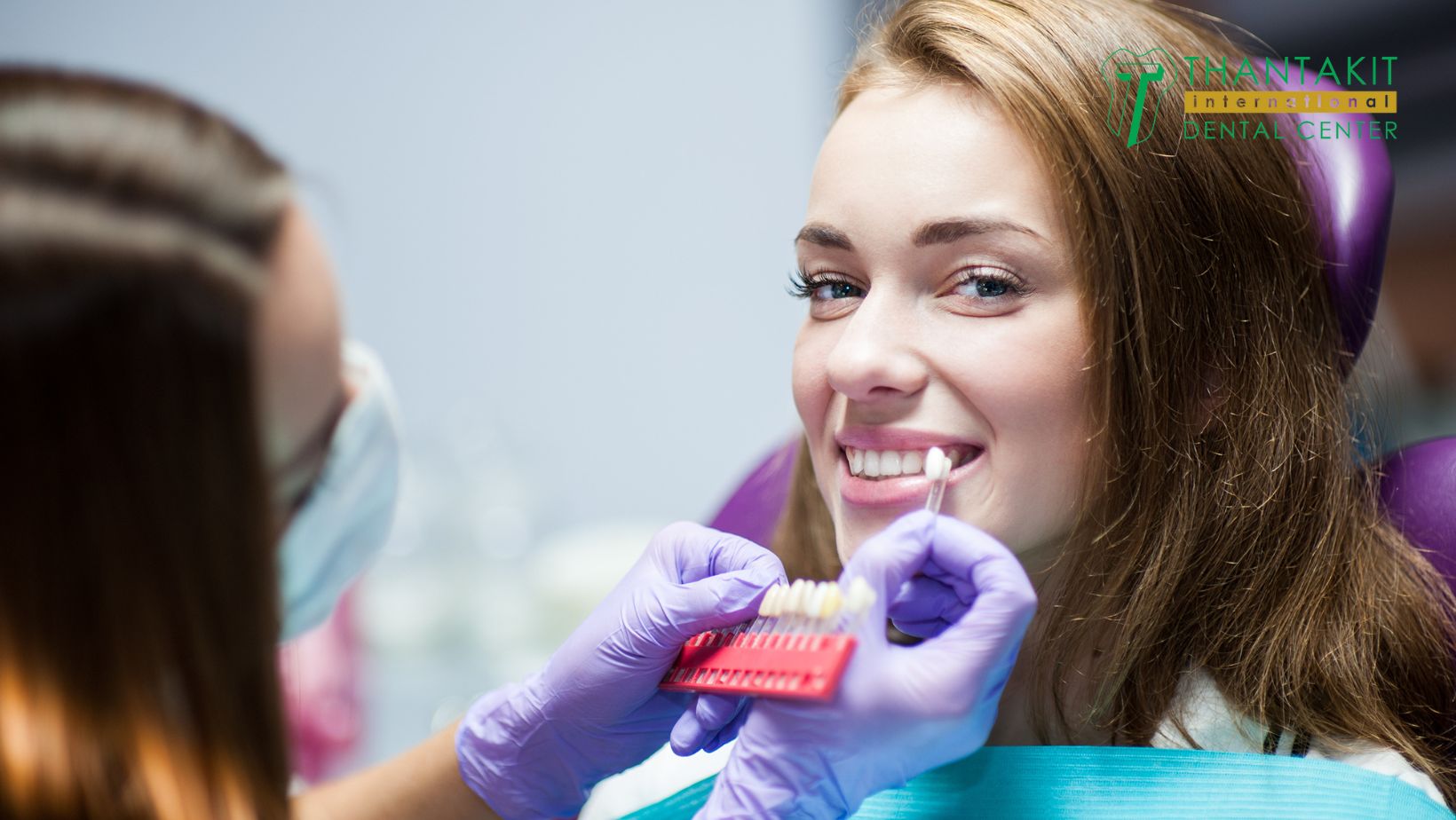
Best Whitening Methods for Sensitive Teeth: Detailed Analysis
Based on extensive clinical experience and patient outcomes, I’ve identified the most effective and gentle whitening approaches for sensitive teeth:
1. In-Office Whitening with Desensitizers
The Zoom!2 Advantage at Thantakit
Our clinic specializes in the Zoom!2 Tooth Whitening system, which I’ve found particularly effective for sensitive teeth patients. Here’s why:
Pros:
- Integrated desensitizing agents (potassium nitrate and fluoride)
- Controlled application by experienced professionals
- Immediate results in a single visit
- Customizable intensity based on patient comfort
- Post-treatment desensitizing protocols
Cons:
- Higher initial investment
- Requires 90-minute appointment
- Some patients experience temporary sensitivity despite precautions
Process Details:
- Pre-treatment desensitizing gel application (15 minutes)
- Protective barriers for gums and lips
- Three 15-minute whitening cycles with comfort breaks
- Post-treatment fluoride application
- Take-home desensitizing gel provided
Expected Results: 4-8 shades improvement Cost at Thantakit: Approximately $300-400 (current prices at Thantakit Dental Center)
Best For: Patients wanting dramatic results with professional monitoring, especially dental tourists with limited time in Bangkok
2. Dentist-Supervised Home Kits
Custom Tray Systems
I often prescribe custom-fitted whitening trays for patients preferring gradual treatment:
Pros:
- Precise fit minimizes gel contact with gums
- Lower peroxide concentrations (10-15%)
- Treatment pace controlled by patient
- Can pause if sensitivity occurs
- More affordable than in-office options
Cons:
- Requires 2–3-week commitment
- Results appear gradually
- Requires discipline for daily use
Our Thantakit Protocol:
- Digital impressions for perfect tray fit
- Professional-grade gel with desensitizers
- Detailed usage instructions
- Weekly progress checks
- Sensitivity management guidance
Expected Results: 3-6 shades improvement Cost: $250-400 Best For: Patients with mild to moderate sensitivity wanting control over their treatment pace
3. Gentle Over-the-Counter Formulations
For patients seeking immediate solutions or maintenance between professional treatments, I recommend:
Recommended Products:
- Strips: Crest 3D White Gentle Routine (5.25% hydrogen peroxide)
- Toothpaste: Sensodyne True White (gradual whitening with sensitivity protection)
- Gel: Opalescence Go 10% (pre-filled trays with potassium nitrate)
Selection Criteria:
- Peroxide concentration under 6%
- Added desensitizing ingredients
- Short application times (30 minutes or less)
- Positive clinical studies
4. Natural and Alternative Methods
While less dramatic, these options suit extremely sensitive patients:
Oil Pulling
- Mechanism: Removes surface bacteria and light staining
- Method: Swish coconut oil for 10-15 minutes daily
- Results: Minimal whitening, improved oral health
- Best for: Patients avoiding all chemicals
Baking Soda Applications
- Mechanism: Mild abrasive action
- Method: Gentle brushing 2-3 times weekly
- Caution: Excessive use can damage enamel
- Best for: Surface stain removal
5. Non-Bleaching Cosmetic Solutions
For severe sensitivity cases, I may recommend:
Dental Veneers
- Permanent color change without bleaching
- Covers intrinsic stains
- Cost: $500-1,500 per tooth
- Ideal for selective teeth or severe discoloration
Dental Bonding
- Less invasive than veneers
- Good for minor color corrections
- Cost: $150-400 per tooth
- Suitable for small areas
Recommended Products for Sensitive Teeth: Expert Analysis
Professional-Grade Solutions
Zoom!2 with Relief ACP At Thantakit Dental Center, this remains my top recommendation because:
- Clinically proven 6-shade average improvement
- Built-in amorphous calcium phosphate (ACP) for enamel protection
- Adjustable light intensity for sensitive patients
- Immediate professional intervention if discomfort occurs
Opalescence PF 10%
- Contains potassium nitrate and fluoride
- Viscous gel stays in place better
- Available through dental professionals only
- Ideal for patients wanting professional-grade home treatment
Over-the-Counter Champions
Sensodyne Pronamel Gentle Whitening
- Why it works: Combines sensitivity relief with gradual stain removal
- Best for: Daily maintenance and prevention
- Active ingredients: Potassium nitrate, sodium fluoride
- Usage: Twice daily brushing
Colgate Optic White Pro Series Sensitive
- Why it works: Lower peroxide with enamel-safe formula
- Best for: Moderate staining with mild sensitivity
- Active ingredient: 3% hydrogen peroxide
- Usage: Once daily for two weeks
Desensitizing Support Products
GC MI Paste Plus
- Professional recommendation for pre/post whitening
- Contains Recaldent (CPP-ACP) for remineralization
- Apply nightly for one week before whitening
- Continue use during treatment for comfort
Relief ACP Oral Care Gel
- Prescription-strength desensitizer
- Use immediately after whitening sessions
- Provides calcium and phosphate for enamel repair
- Reduces post-treatment sensitivity by up to 70%
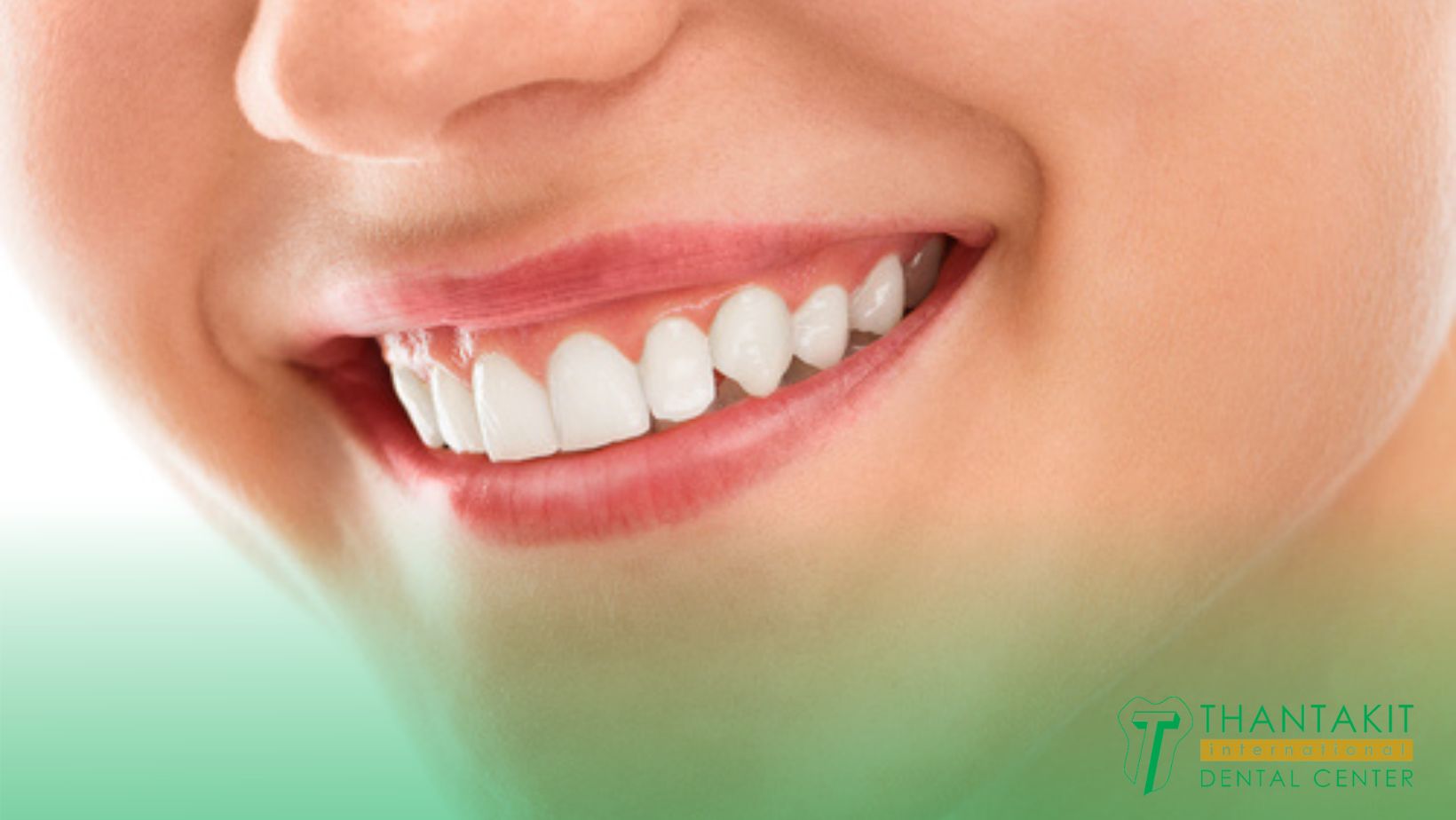
Comprehensive Sensitivity Management: Before, During, and After Whitening
Two Weeks Before Treatment
Week 1-2 Preparation Protocol:
- Switch to desensitizing toothpaste (use twice daily)
- Begin fluoride rinse routine (once daily)
- Avoid acidic foods and beverages
- Schedule professional cleaning if needed
- Address any dental issues
During Treatment Phase
Daily Management Routine:
- Morning: Gentle brushing with soft-bristled brush
- Pre-treatment: Apply desensitizing gel 30 minutes before whitening
- During: Take breaks if discomfort occurs
- Post-treatment: Fluoride application
- Evening: Remineralizing paste before bed
Dietary Modifications:
- Avoid: Citrus, tomatoes, wine, coffee (first 48 hours)
- Embrace: Neutral pH foods, room temperature beverages
- Hydrate: Increase water intake to dilute acids
Post-Whitening Care (First Week)
- Continue desensitizing toothpaste for 2 weeks minimum
- Use prescribed remineralizing agents nightly
- Avoid extreme temperatures in food/drinks
- Maintain excellent oral hygiene
- Schedule follow-up if sensitivity persists beyond 72 hours
Long-Term Maintenance
At Thantakit Dental Center, we provide patients with customized maintenance plans including:
- Quarterly professional cleanings
- Annual touch-up treatments
- Ongoing sensitivity monitoring
- Dietary counseling for stain prevention
Addressing Common Myths: Evidence-Based Clarifications
Myth 1: “Whitening Always Damages Enamel”
Fact: Professional whitening with appropriate concentrations and protocols does not permanently damage enamel. Studies show that enamel microhardness returns to normal within two weeks post-treatment when proper remineralization protocols are followed.
Myth 2: “Natural Methods Are Always Safer”
Fact: Many “natural” remedies can be more harmful than professional products. Lemon juice (pH 2.0) erodes enamel rapidly, while professional whitening gels are pH-balanced (6.5-7.0) for safety.
Myth 3: “Once Sensitive, Always Sensitive After Whitening”
Fact: With proper desensitizing protocols, 95% of my patients experience no lasting sensitivity beyond 72 hours post-treatment. Modern formulations have dramatically reduced this side effect.
Myth 4: “Expensive Treatments Work Better for Sensitive Teeth”
Fact: Cost doesn’t always correlate with gentleness. Some affordable options with lower peroxide concentrations may be more suitable for sensitive teeth than premium high-concentration systems.
Myth 5: “You Can’t Whiten Crowns or Fillings”
Fact: While true that restorations don’t whiten, strategic treatment planning can achieve uniform appearance. At Thantakit, we often replace old restorations post-whitening to match the new shade.
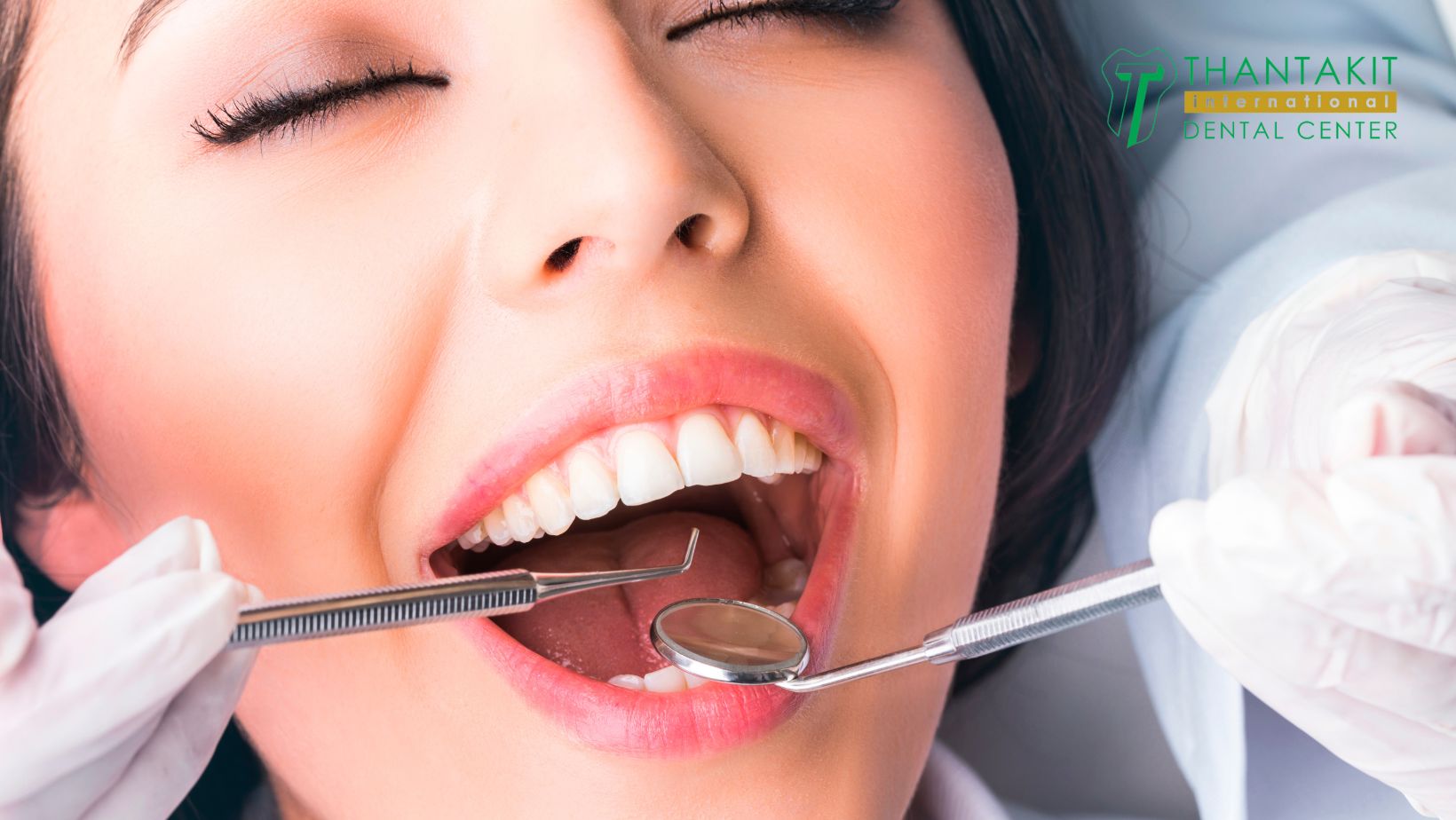
FAQs About Teeth Whitening for Sensitive Teeth
Can I whiten if I have sensitive teeth? Yes, with appropriate products and professional guidance. At Thantakit Dental Center, we successfully treat sensitive teeth patients daily using customized protocols.
How long does post-whitening sensitivity last? Typically 24-72 hours with proper management. If sensitivity persists beyond three days, contact your dentist for evaluation.
Are natural methods safer for sensitive teeth? Not necessarily. Professional products are pH-balanced and tested for safety. Many natural remedies can increase sensitivity through enamel erosion.
What should I do if my teeth hurt during whitening? Stop immediately, rinse thoroughly, and apply desensitizing gel. For our Thantakit patients, we’re available for immediate consultation and comfort measures.
How often can I safely whiten sensitive teeth? Professional treatments: 1-2 times annually. Gentle touch-ups: Every 3-4 months. Always follow your dentist’s specific recommendations based on your sensitivity level.
Will sensitivity return to pre-whitening levels? Yes, in 98% of cases, any temporary sensitivity resolves completely within one week when proper protocols are followed.
Professional Insight: When to Seek Expert Care
Immediate dental consultation is warranted if you experience:
- Severe, sharp pain lasting over 72 hours
- Visible gum irritation or bleeding
- Extreme temperature sensitivity preventing normal eating
- Pain radiating to jaw or ear
- Any signs of enamel damage or tooth fracture
At Thantakit Dental Center, we maintain emergency availability for our whitening patients, ensuring prompt attention to any concerns.
The Thantakit Advantage: Why Choose Professional Care in Bangkok
As Thailand’s premier destination for safe teeth whitening Bangkok, our clinic offers:
Comprehensive Care Package:
- Initial sensitivity assessment
- Custom treatment planning
- Zoom whitening Thailand’s most advanced system
- Post-treatment support
- Follow-up care included
International Patient Services:
- English-speaking staff
- Convenient location in Bangkok
- Flexible scheduling for dental tourists
- Complete treatment in single visit options
- Coordination with hotels and transportation
Advanced Technology:
- Digital smile design
- Sensitivity mapping technology
- Custom tray fabrication on-site
- Latest generation whitening systems
Maintaining Your Bright Smile: Long-Term Strategies
Daily Maintenance Protocol
Morning Routine:
- Brush gently with sensitive teeth toothpaste
- Floss carefully to prevent gum recession
- Rinse with fluoride mouthwash
Evening Routine:
- Remove daily stains with gentle brushing
- Apply remineralizing paste to sensitive areas
- Avoid late-night acidic beverages
Dietary Considerations
Staining Foods to Moderate:
- Coffee and tea (use straws when possible)
- Red wine and dark sodas
- Berries and beets
- Curry and tomato-based sauces
- Soy sauce and balsamic vinegar
Tooth-Friendly Alternatives:
- White tea instead of black
- Clear spirits over red wine
- Light-colored fruits
- Cream-based sauces
- Plenty of water throughout the day
Professional Maintenance
Schedule regular appointments for:
- Professional cleanings (every 3-4 months)
- Sensitivity assessments
- Touch-up treatments as needed
- Early intervention for any issues
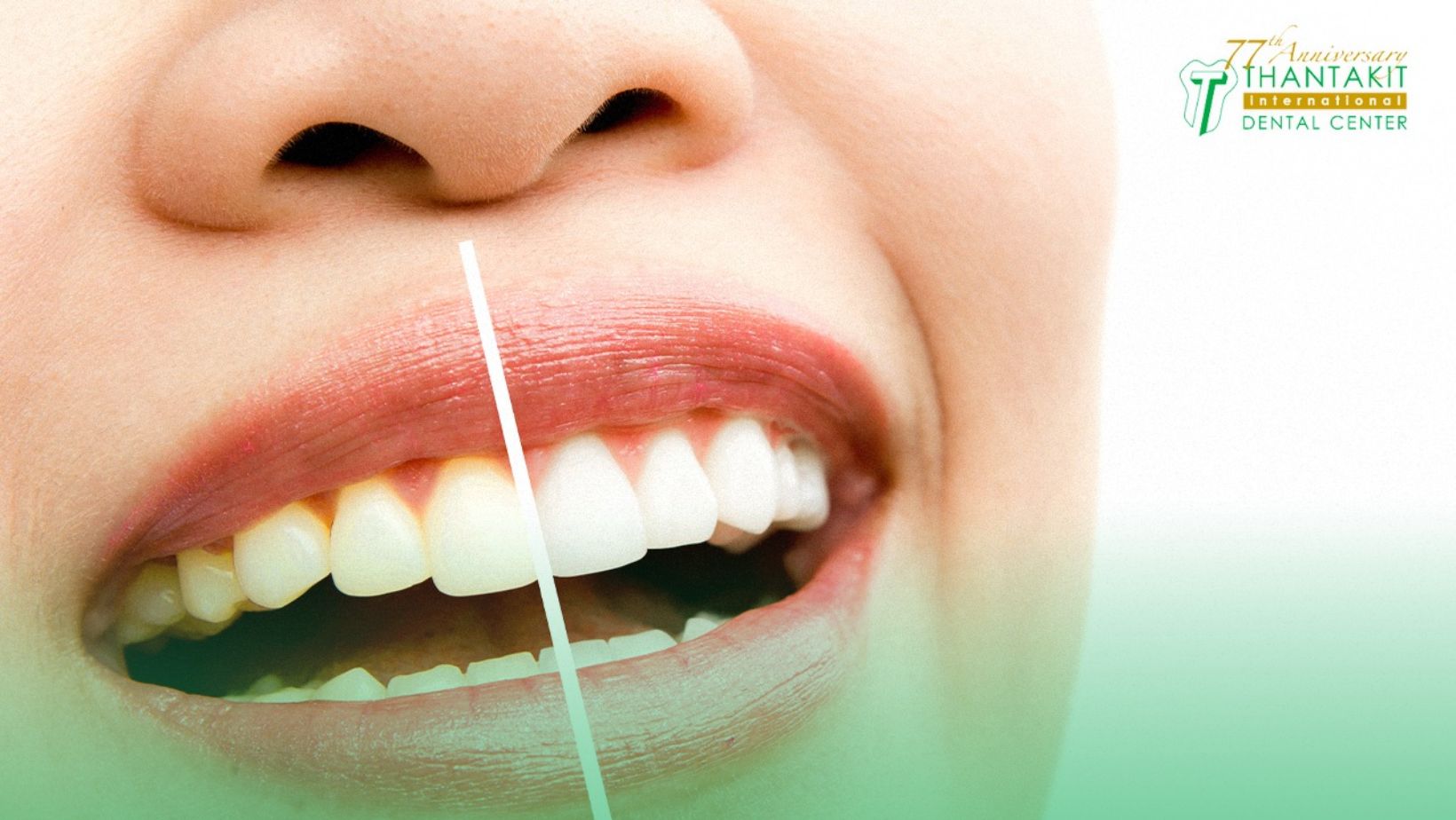
Conclusion: Your Path to a Brighter, Comfortable Smile
Achieving a beautiful, white smile despite tooth sensitivity is entirely possible with today’s advanced treatments and products. As we’ve explored throughout this comprehensive guide, the key lies in choosing the right approach for your specific needs, following proper protocols, and working with experienced professionals who understand the unique challenges of sensitive teeth.
At Thantakit Dental Center, we’ve helped thousands of patients—both local Bangkok residents and international dental tourists—achieve their dream smiles without compromising comfort. Our expertise in handling sensitive teeth whitening, combined with state-of-the-art technology like Zoom whitening, ensures you receive the safest, most effective treatment available.
Remember, every patient’s sensitivity is unique, and what works for one person may not be ideal for another. This is why professional assessment and customized treatment planning are so crucial for achieving optimal results while maintaining comfort throughout the process.
Take the First Step Today
Don’t let sensitive teeth keep you from the bright, confident smile you deserve. Schedule a consultation at Thantakit Dental Center to discover how our specialized approach to teeth whitening for sensitive teeth can transform your smile safely and comfortably.
Contact Thantakit Dental Center today:
- Explore our gentle Zoom whitening Thailand options
- Receive a personalized sensitivity assessment
- Learn about our comprehensive care packages for international patients
- Start your journey to a brighter smile without the worry
Our team of specialists is ready to guide you through every step of the whitening process, ensuring your comfort and satisfaction from consultation through to your brilliant new smile. Whether you’re a Bangkok local or visiting Thailand for dental tourism, we’re here to make your whitening experience positive, pain-free, and perfectly tailored to your sensitive teeth needs.
Book your consultation now and discover why Thantakit Dental Center is Bangkok’s trusted choice for safe, effective teeth whitening for sensitive teeth.





